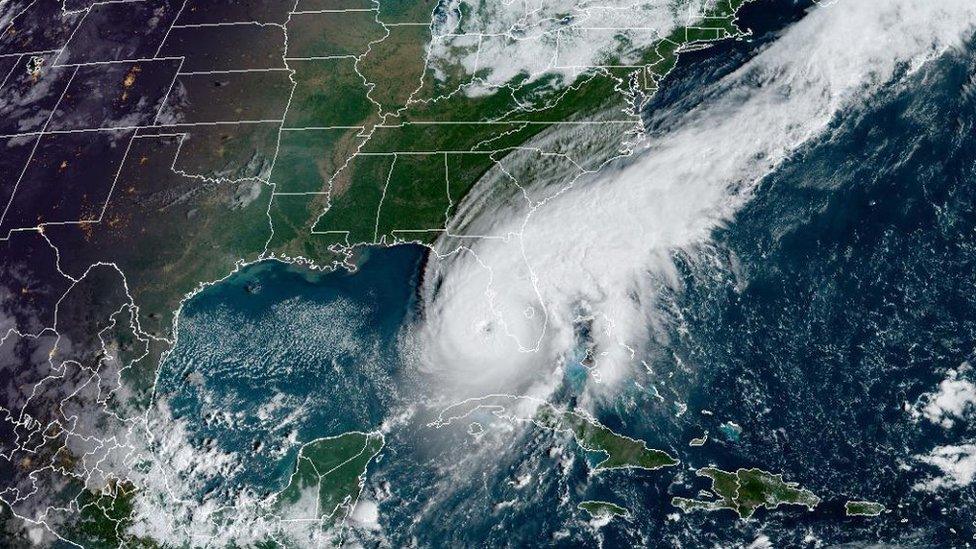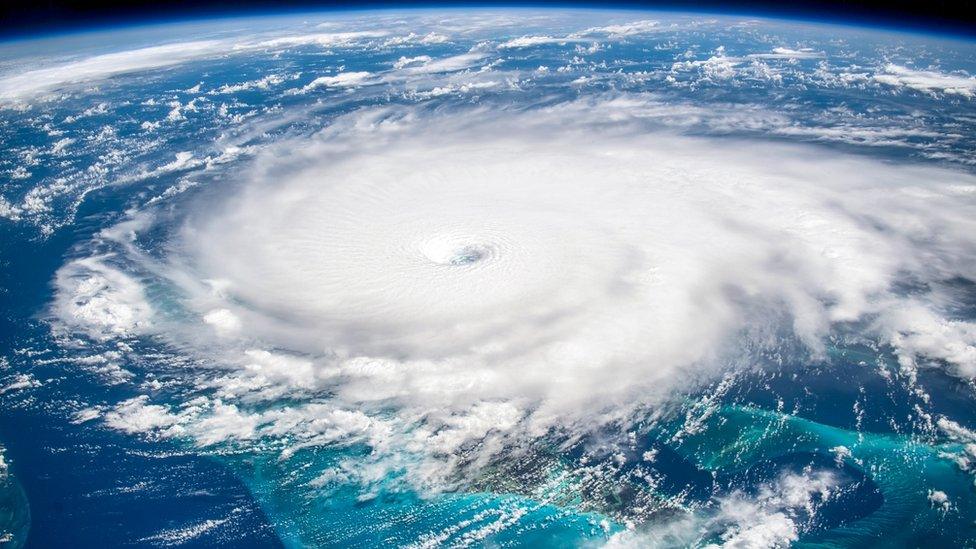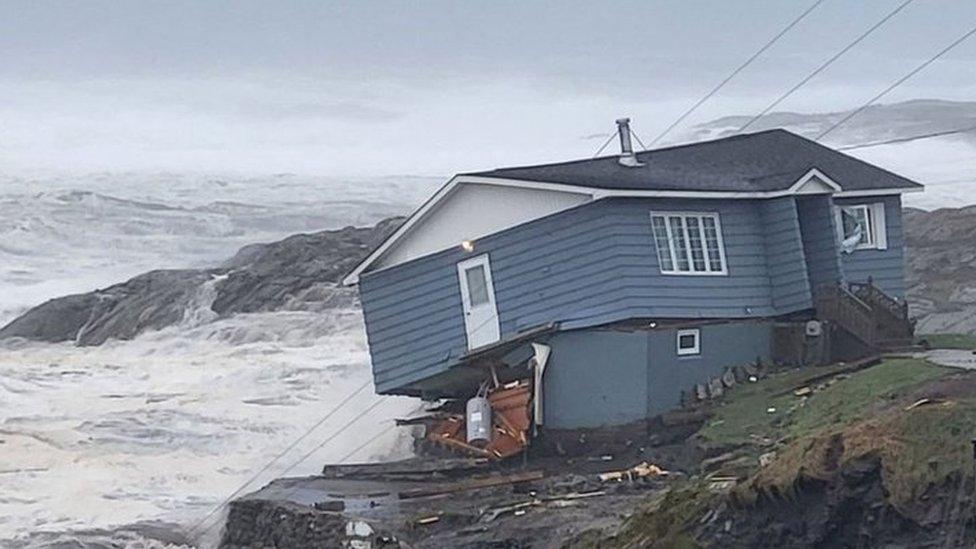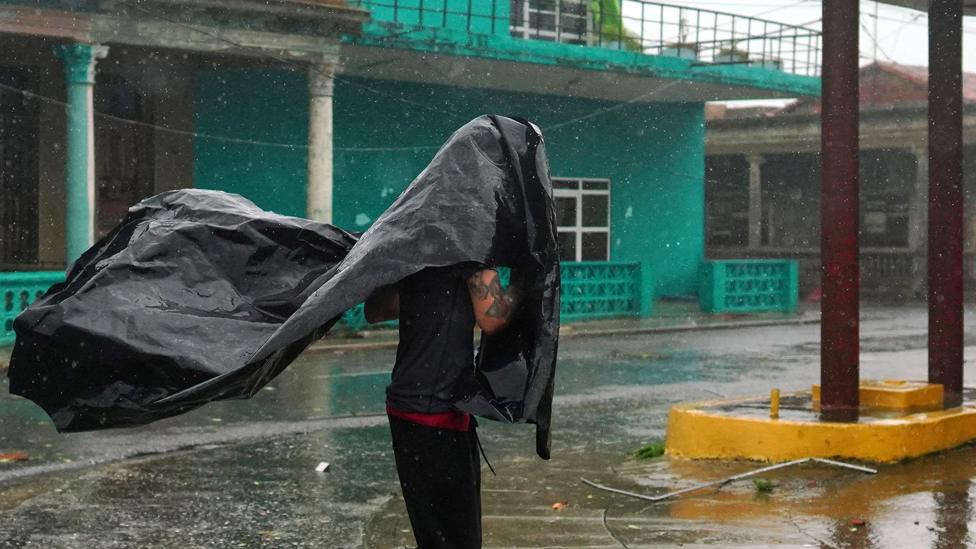Hurricane Ian makes landfall with catastrophic wind and rain
- Published
WATCH: Waves crash on Florida shore as hurricane approaches
A life-threatening hurricane has made landfall on Florida's south-western coast, bringing heavy rain, high winds and catastrophic storm surges.
Hurricane Ian has sustained wind speeds up to 250km/h (155mph), just shy of the threshold for category five storms - the strongest classification.
Millions of Floridians with homes in Ian's path are under evacuation orders.
Those who remained are facing one of the most dangerous storms to hit the US in decades.
More than one million Florida residents have lost power, after Ian knocked out power in all of Cuba.
"Pray for people," Florida Governor Ron DeSantis said on Wednesday, adding that Ian was of "historic" proportions.
It will be a "nasty, nasty day," he said.
Much of Ian's damage will likely result from from its massive storm surges - walls of water that are carried by hurricane-force winds onto land.
"The Gulf of Mexico is literally moving inland across the beaches into the communities," said Erik Salna, associate director of the International Hurricane Research Center. "That invasion of water is just hard to even imagine until you see it for real."
Statistically and historically, water kills more people than wind, Mr Salna said. And Ian is "a worst-case scenario amount of water".
Almost all of Florida's west coast is under some form of storm surge warning. Areas near Fort Myers - a popular tourist spot, which has taken the brunt of the storm thus far - may see storm surges up to 18ft (5.4m) tall.
Ian officially made landfall at around 15:10 local time (20:10 GMT), striking Cayo Costa, an island just west of Fort Myers.
The storm was initially expected to make a direct hit on the densely populated Tampa Bay and St Petersburg region - the first direct hit on this area in 101 years - but the storm made contact further south.


While Ian's winds are spinning rapidly, the actual pace of the storm is closer to 15kmh (9mph) - making it a slow-moving system.
Ian is expected to slow even further, effectively prolonging the storm's effects and threatening up to 2ft of rain in some areas - the amount cities like DC and London will see over 6 months.
"It's bad for rainfall totals - it rains over and over again in the same area," said Joel Klein, a coordinator with the National Weather Service. "Anytime you start measuring rain in terms of feet instead of life-threatening rain fall."
And much of this rain will fall sideways, Mr Klein said, slamming into people and buildings with the force of the storm.
"I can't stress enough the damage that's going to come out of this. Power is going to be out for weeks," he said.

Ian is expected to cause life-threatening storm surges
Tornadoes have already been seen in southern Florida, the National Weather Service said. Conditions were "rapidly deteriorating" along the south west coast of Florida at 06:00 local time (11:00 GMT), the NHC reported.
Governor DeSantis said there was a "major" recovery effort in place for after the storm has passed including emergency services and linemen.
He urged residents to be "cautious" and avoid hazards such as down power lines, standing water and damaged trees.
Residents have been buying water bottles in bulk, boarding up windows and moving garden furniture inside. Schools and universities have also cancelled classes for the week.
Theme parks such as Disney World, Sea World and Busch Gardens in Tampa are closing as the storm bears down, while Nasa has postponed the planned launch of a moon rocket at Kennedy Space Center.
The Artemis I Moon rocket - which has already had its launch postponed twice - has been removed from the launchpad to the vehicle assembly building to protect it from the approaching storm.
St Petersburg resident Jean Fargo told the BBC she had reluctantly left her home on the coast, evacuating to a local shelter.
Along Florida's Gulf Coast, residents told the BBC that they were banding together with their neighbours for support - regardless of their differences.
"We've made friends with the people next to us. They have different political stripes, but we all agree that this disaster doesn't involve politics at all," said St Petersburg resident Jean Fargo.
Ms Fargo had been through storms before, she said, "but this one is different".



How have you been affected by hurricane Ian? Share your story by emailing haveyoursay@bbc.co.uk, external.
Please include a contact number if you are willing to speak to a BBC journalist. You can also get in touch in the following ways:
WhatsApp: +44 7756 165803
Tweet: @BBC_HaveYourSay, external
Please read our terms & conditions and privacy policy
If you are reading this page and can't see the form you will need to visit the mobile version of the BBC website to submit your question or comment or you can email us at HaveYourSay@bbc.co.uk, external. Please include your name, age and location with any submission.
- Published27 September 2022

- Published25 September 2022

- Published28 September 2022
